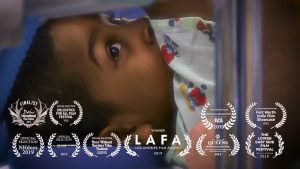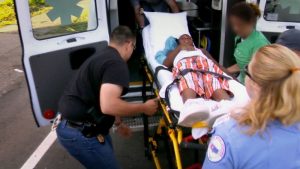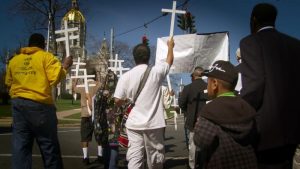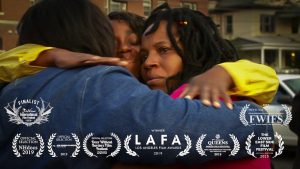The Hartford Courant Publishes A Sweetest Land Op-Ed
 When you spend nights and weekends in one of New England’s most violent cities, you realize how little you know and how much can be revealed.
When you spend nights and weekends in one of New England’s most violent cities, you realize how little you know and how much can be revealed.
For years, I focused my camera on Connecticut’s capital city of Hartford. I was embedded with police, clergy, community organizations, emergency personnel and victims of violence. That footage is now part of “The Sweetest Land,” a documentary film playing at select festivals nationwide.
Beyond the inequities of how urban and suburban violence are treated, we have a clear ability to improve lives where violence most occurs — and at no additional cost.

In the emergency room, there are days when multiple gunshots victims arrive. Yet uncontrollable bleeding is immediately met with life-saving efforts. Instantly, a quiet space transforms as highly skilled individuals urgently apply the best-known protocols to heal. The trauma room is a sacred space: It mandates equality. Race, gender, economic status and political affiliation are of no concern. Instead, evidence-based procedures are applied regardless of who shows up.
That is what systems can accomplish when the best available practice is required. But what is actually being done to prevent these injuries in the first place?
We spend millions of dollars without knowing whether youth violence programs even work. This was from the U.S. surgeon general in 2001:
 “Hundreds of youth violence prevention programs are being used in schools and communities throughout the country, yet little is known about the actual effects of many of them. Few such programs have been rigorously evaluated, including many ongoing efforts. The evaluations that have been done indicate that much of the money America spends on youth violence prevention is spent on ineffective — sometimes even harmful — programs and policies.”
“Hundreds of youth violence prevention programs are being used in schools and communities throughout the country, yet little is known about the actual effects of many of them. Few such programs have been rigorously evaluated, including many ongoing efforts. The evaluations that have been done indicate that much of the money America spends on youth violence prevention is spent on ineffective — sometimes even harmful — programs and policies.”
Blueprints, part of the Institute of Behavioral Science at the University of Colorado at Boulder, has found tested, effective programs that work when implemented fully and faithfully, not in halfway measures.
To be fair, there are extraordinary individuals and organizations in prevention and victims’ services who clearly improve the lives they serve.
We can do better.
 When prevention works, it is no different from the life-changing moments in a trauma room. When you meet the humans whom violence prevention has failed, you gain an instant understanding of how important standards of care are, using the best methods with qualified prevention providers and rigorous evaluation. It is what we pay for.
When prevention works, it is no different from the life-changing moments in a trauma room. When you meet the humans whom violence prevention has failed, you gain an instant understanding of how important standards of care are, using the best methods with qualified prevention providers and rigorous evaluation. It is what we pay for.
Yet we rarely demand outside audits on prevention programs. CNN found that $54 million was entirely misspent on Chicago’s violence prevention efforts. The cracks grow wider as well-intentioned organizations and individuals serve as therapist, social worker, life coach, etc., but potentially lack the educational credentials or proven methods to produce change.
Connecticut’s lawmakers should demand proven standards of care for violence-prevention services in cities, as well as credentialed providers and evidence-based methods. They should verify that the services offered are actually being offered. They should not accept program “skimming,” accepting only youths, victims and families who have the best chances of success, rather than those most at risk of violence.
 For “The Sweetest Land,” we traveled from Georgia to Boston. We heard similar stories time after time. Struggling families didn’t get help. Hartford has a few new programs in place to connect with victims of violence and their families. The question is whether they are preventing further violence. The city needs a qualified and independent inspector general to make sure those programs are getting properly evaluated.
For “The Sweetest Land,” we traveled from Georgia to Boston. We heard similar stories time after time. Struggling families didn’t get help. Hartford has a few new programs in place to connect with victims of violence and their families. The question is whether they are preventing further violence. The city needs a qualified and independent inspector general to make sure those programs are getting properly evaluated.
Keep in mind that when violence strikes an urban area, normally a nation does not mourn with the victims’ families as it does those of mass shootings. Rarely are outpourings of funds established to meet urban family needs. In the too many deaths I have filmed, the hardships are overwhelming.
This disconnect existed with every victim of violence I captured.
We applaud that violence statistics are down in Connecticut overall, and that fewer people are incarcerated. These are major accomplishments. But make no mistake, violence persists.
 It is preventable and it is actionable. And to any elected official and legislator, if you can guarantee that our best efforts are implemented and working — as if it were your child at-risk — you too would represent “The Sweetest Land.“
It is preventable and it is actionable. And to any elected official and legislator, if you can guarantee that our best efforts are implemented and working — as if it were your child at-risk — you too would represent “The Sweetest Land.“
Jeffrey B. Teitler is a professor of Communication at Central Connecticut State University and artist in residence at St. Francis Hospital and Medical Center.
LIVES CAN MATTER
Join our FACEBOOK and INSTAGRAM for additional news, screening dates and updates on THE SWEETEST LAND.
THE SWEETEST LAND – Documentary Synopsis